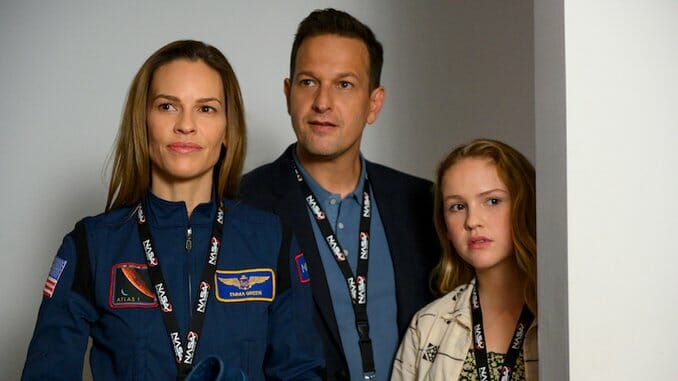Netflix’s Space Drama Away Is an Inspirational Blockbuster
Photo Courtesy of Netflix
Editor’s Note: This review originally published Friday, August 28, 2020
While watching Away, Netflix’s sweeping series about the first mission to Mars, I thought about The West Wing a lot. The drama, which ran on NBC from 1999-2006, has been a bit of a respite during these pandemic times. Perhaps it’s our nostalgia for a time when network dramas were at their peak. Perhaps it’s a longing for a compassionate, intelligent President. Or a wistfulness to return to a simpler time.
Over the past few decades prestige television has taken a turn. Dramas are darker and complex with dense plot lines, antiheroes, and a plethora of characters you need a flowchart to keep track of. There’s a notion that perhaps feel good, inspirational dramas aren’t as important or worthy of praise.
I’m here to tell you that’s incorrect. Away is a 10-episode crowd pleaser. It’s a blockbuster TV series during a time when blockbuster movies aren’t in theaters (or at least they shouldn’t be). Hilary Swank headlines as American astronaut Emma Green. She leaves her husband Matt Logan (Josh Charles) and her 15-year-old daughter Lex (Talitha Bateman) to command a three-year mission to Mars, heading up an international crew comprised of Russian astronaut Misha Popov (Mark Ivanir), British botanist Dr. Kwesi Weisberg-Abban (Ato Essandoh), Indian astronaut Ram Arya (Ray Panthaki), and Chinese chemist and astronaut Lu Wang (Vivian Wu).
The series is awe-inspiring in scope, and the scenes in space are gorgeous. Knowledge of the particulars of space travel is woven throughout the narrative, both what’s possible and the daily physical struggles astronauts endure. The special effects are so precise and authentic you feel like you are in space with the astronauts. (Although, of note, I drop cell phone calls every time I pull into my driveway but Emma and crew have few issues face-timing on their way to the moon, the mission’s first stop.) And while the series so accurately simulates a gravity-free environment, it struggles to find wigs that didn’t look fake for Emma and Matt’s flashback scenes.
Executive producer Jason Katims perfected the art of feel-good TV with series including Friday Night Lights and Parenthood. He knows it’s the little moments that make the big moments important and that interpersonal drama drives a series. Like in any workplace environment, the crew of the Atlas squabbles. Misha, the astronaut with the most experience, constantly questions Emma’s decisions. Lu, who has to hide so much of herself from the world, has little tolerance for how Emma lets her emotions affect her. Ram gets frustrated by the risks Emma is willing to take and Kwesi must deal with being on his first space mission. At first it seems like the series is leaning too far into the stereotypes about the countries the astronauts are from. But as the series progresses, their outer façades are peeled back to reveal a more complex, nuanced characters. The notion that countries and people can work together to achieve greatness is the consistent and very welcomed undercurrent to the series, making the drama not only inspirational but aspirational.
Like The West Wing, the characters give grand speeches without being cheesy; Away walks the narrow line between being an authentic drama that pulls you in and an over-the-top schmaltz fest. A lot of that credit goes to Swank, who is saddled with a lot of the stirring dialogue and monologues. Like Martin Sheen, Swank brings such authenticity to everything she says that you believe her instead of wanting to roll your eyes. Bateman is also particularly effective as a teenager struggling with all that is happening around her and trying to find her place in it.
-

-

-

-

-

-

-

-

-

-

-

-

-

-

-

-

-

-

-

-

-

-

-

-

-

-

-

-

-

-

-

-

-

-

-

-

-

-

-

-








































